Innovation is the establishment of new or improved equipment and processes that are often driven by information technology, among other key factors. Product innovation comes with many benefits to both the supplier and the consumer.
Companies can only prove their responsiveness to customers’ demands through improved product quality and design. The mobile phone evolution is a good example of the role played by innovation in today’s business world.
This paper compares and contrasts the innovative abilities, successes and failures of Nokia, Motorola and Apple.
Nokia
Nokia is a multinational communications company based in Keilaniemi, Espoo. The company produces mobile devices for all major market protocols and segments. Nokia continues to attract users of its exclusive multimedia devices from every part of the world.
The quick technological progress and transformation which has imbibed the mobile phone industry has greatly contributed in making Nokia what it is today. Through high end innovative abilities over the years, Nokia mobile has succeeded in creating a niche amongst the users.
This has seen the corporation come to rule the robust communication industry with their huge-spectrum of quality mobile phone products. Innovation in the mobile phone industry has been stipulated by the increasing demand of these devices in the contemporary world.
The graph below indicates the growth of mobile phone usage in the world since 1987 – 2006.
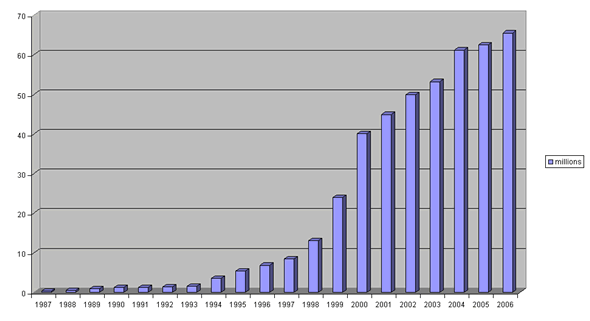
Nokia has always proved its ability in innovation by designing their mobile devices in a more desirable, functional and sustainable manner that satisfies the needs of the customers.
The company has made great advancement in the modification of its mobile devices from the NMT-900 series of the 1980s, to the sophisticated modern day series.
According to Nokia, Inc., the company is known for its agility to change with the times, to match the competitive trend of the market, where changes in customers’ preferences is the key determinant (The Nokia Story).
The corporation has continued to garner much interest globally, as the most preferred choice of mobile manufacturer, owing to their ability to incorporate user-friendly features in their devices.
Unlike the old and obsolete technology of the past, modern Nokia mobile devices come with smart features that are sustained with sophisticated designs.
Modern versions of the Nokia cell phone have proved to be a major attraction to millions of users globally, who have grown to fancy the smart phone lifestyle. The latest Nokia products are based in 3G/WCDMA, EDGE/GSM and CDMA mobile technologies.
All these innovations come in sleek dimensions, compared to the bulky technologies of the past. Among the many features found in Nokia’s latest mobiles include well-sized TFT displays that have been made into a combination of amazing pixel and vibrant colours.
The handsets are also packed with pre-installed Carl Zeiss optics and built-in cameras that are certain to provide excellent resolution. Another outstanding feature of the latest versions of the Nokia mobile is their memory feature which enables users to manage useful applications effectively.
Following is a recent graph showing the Market Share Estimates of Nokia, Motorola and Apple, among other Smartphones.
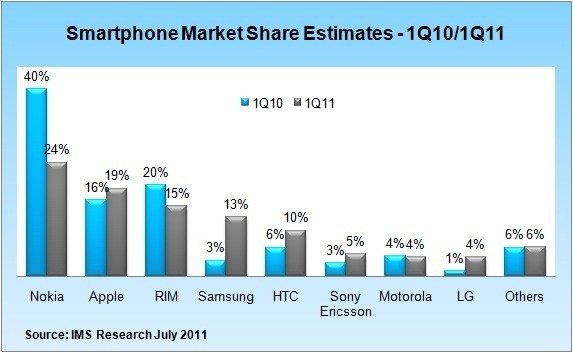
These successful innovation strategies have granted the company a global reputation as the market leader in mobile phones, for nearly two decades. This glory however, would be brought into a sudden halt by the entry of new competitors in the market.
Even though Nokia has tried to accelerate its pace of new developments in cell phone devices, their track record is much weaker compared to that of Apple (Gassee 3).
The company’s relative failure can be observed in its dwindling market share in the mobile device market, which has dropped from 40 percent five years ago to an estimated value of just 23 percent this year.
Today, the company is squeezed from the top by Apple and from the bottom by Motorola, among other upcoming companies.
Motorola
Ever since its inception in the 1920s, Motorola has been defined by a culture of innovation. Unlike Nokia, whose main products are mobile phones, most of Motorola’s products are radio-related.
Motorola is widely reputed across the world, for its exclusive ability to offer state-of-the-art technology solutions.
The company had been a leader of innovation in the communications sector and the largest manufacturer of mobile phone devices globally, before it was overtaken by Nokia in the year 1998.
Motorola has not only displayed great ability in innovative matters, but it has also proved to be a major player in the communications sector.
Recently, the company has helped to drive the evolution of the mobile phone technology from the communications product of the past to the modern multi-functional device which is characterized by numerous exciting and convenient features of the day.
Motorola’s outstanding innovation abilities can be seen in its wide collection of Smartphone which include StarTAC®, DynaTAC, RAZR® phones and the DROID™.
After many years of extensive research, Motorola would make history in 1983, when its DynaTAC 8000x was approved as the first commercial portable mobile phone in the world (Ahmed 39).
This helped in revolutionizing the entire communications industry in a manner that would change the lives of many people around the world.
The diagram below shows the performance of Motorola unit sales from 2007 – 2010.
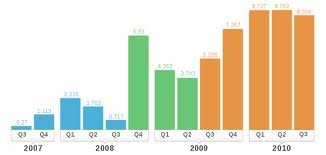
Released in the year 1983, DynaTAC was the first mobile device by the company. This would see Motorola become more popular worldwide, as the company which brought the idea of mobile phones into the world.
In 1989, Micro TAC, the Flip Phone which had improved features was launched. This was followed closely by the Star TAC, which came amid great competition from giant competitors such as Ericsson and Nokia.
Next was the Droid, which continues to make great transformations in the sector. Today, Motorola enjoys the pride of being the hottest mobile phone brand in the world.
The company boasts a wide range of exclusive designs which include the razor-thin RAZR, Sprint and AT&T, the SLVR, and the KRZR, among other innovations.
According to Motorola Mobility, Inc., the company’s investment in technology and innovation research has led to the development of products which have empowered the users to have easy access of all forms of information, whenever they wish (Approach to Innovation).
However, regardless of its reputation as the pioneer of the mobile, Motorola is fighting to regain its composure in the market. The global changes in the perception of the mobile device over the years have left the company behind.
The company can also be blamed for their failure to recognize the value of software and emphasizing a lot of focus on hardware design. These, among other multifaceted problems have seen the company’s market share and profits drop by the day.
The following diagram shows the penetration of Smartphone in different world wide markets
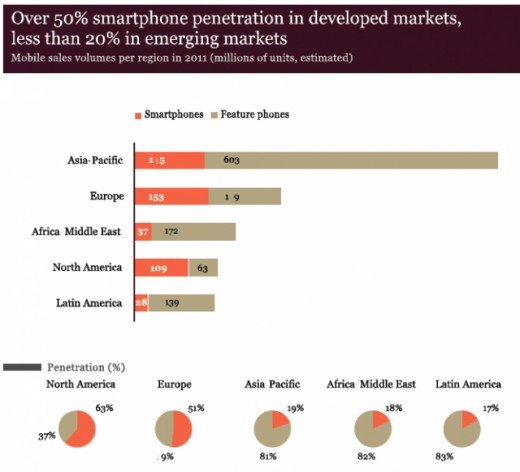
Apple
Apple is a multinational corporation based in the U.S. which designs and sells a wide range of consumer electronics, personal computers and computer software.
The company was first incorporated in the year 1977 as Apple Computer, Inc., before the name was changed to Apple, Inc thirty years later. Apple also plays a key role in the manufacture of mobile phone products.
The company is known for its innovation ability which has brought great transformations in the latest innovations of the devices.
Apple has made a mark in the development of latest mobile phone innovations, thus changing the face of these communication gadgets completely (Apple, Mac OS, and iDevices).
The iPhone is one of the most sought after mobile devices in the modern world, owing to its rapid transformation into one of the most exciting gadgets ever. Apple mobile phones are also the most popular smart phones in the contemporary world.
These are the newest generations of mobile phones which are aimed at making a difference in the dynamic communication world.
IPhone series have been designed to give the users the ability they need to perform their jobs professionally and in an effective manner (Remneland-Wikhamn and Ljungberg 205).
The first development of the iPhone was officially launched in January, 2007, by the then group CEO, Steve Jobs. The phone was made into various impressive features which included applications such as Safari and Google. The device also came up with Bluetooth and Wi-Fi connectivity options.
This development gave birth to other innovations, all of which came up with improved features and applications. The year 2008 saw the introduction of iPhone 3G, a version that came up with a number of upgraded features.
Apple iPhone 3GS was released just a year later and it proved to make a difference with its voice control and video recording capabilities, among other exciting features.
The year 2010 saw the company announce the introduction of Apple iPhone 4 at WWDC 2010. This category was rated the company’s biggest development since the initial iPhone and it had many new features and modifications.
The phone’s display had a stunning resolution that offered a viewing experience much better than that of the preceding model. The device’s A4 processor is made in a manner that allows multi tasking. It also has a 5MP camera and a gyroscope which enhances gaming applications.
The latest version of the iPhone was announced in 2011, but it would be associated with many failures.
Antenna problems and Sim Card failure are some of the problems that were associated with iPhone 4S. These, among other design and marketing problems are some of the numerous innovation problems which continue to affect the development of Apple mobile phone.
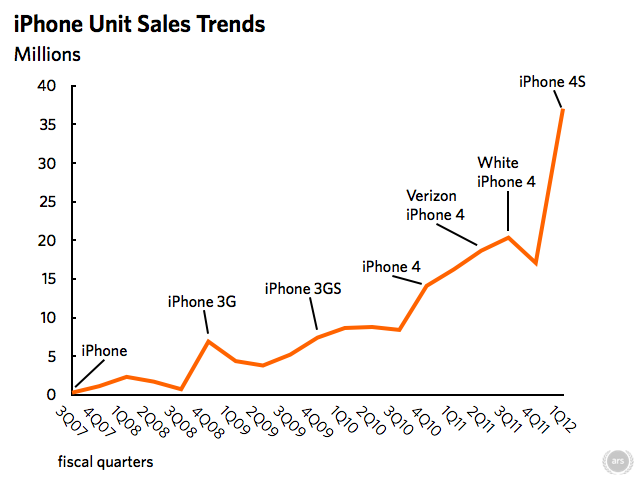
In conclusion, Motorola is a prime example of a successful innovative business, among the three mobile phone brand companies featured in this analysis. For many years, the company has ruled the industry with dominant forms of technology.
Nokia has also managed to uphold its innovation ability, as it is evident in its numerous smart devices, despite the bad performance of its smartphone business recently. However, Apple appears to have failed in their innovation attempts in the mobile phone development.
Despite its outstanding role in the transformation of the device, the company is yet to prove its innovation ability in the sector, by developing devices that are free from defaults.
Apple’s case however is understandable considering the fact that they are still at their infant stage in the manufacture of mobile devices.
The company has also concentrated much in computers and computer software more than anything else over the years and this is another reason which may explain its slow success in mobile phone innovation.
Works Cited
Ahmed, Pervaiz. “Culture and climate for innovation.” European Journal of Innovation Management 1. 1 (1998): 30-43. Print.
Apple, Mac OS, and iDevices 2012. Web.
Approach to Innovation 2012. Web.
Gassee, Jean-Louis. “Nokia: Three Big Problems.” Monday Note. 2012. Web.
Remneland-Wikhamn, BJorn and Ljungberg, Jan. “Open innovation, generativity and the supplier as peer: the case of iPhone and Android.” International Journal of Innovation Management 15. 1 (2011): 205. Print.
The Nokia Story 2012. Web.